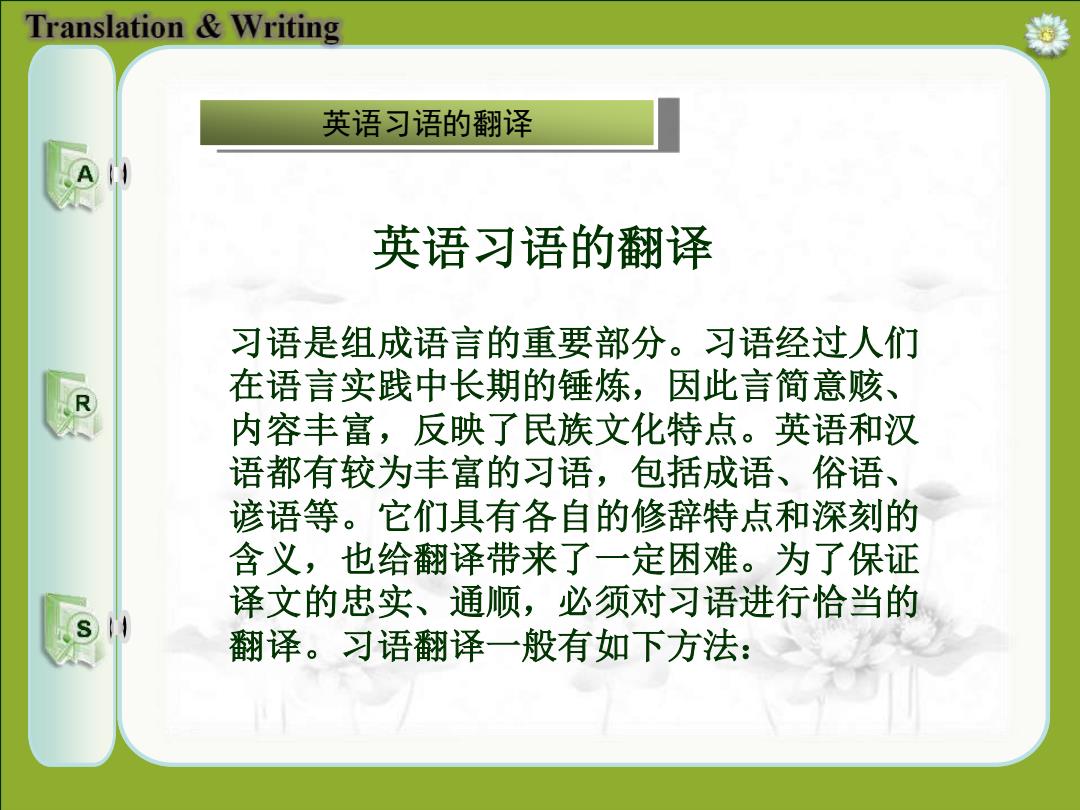
Translation Writing 英语习语的翻译 英语习语的翻译 习语是组成语言的重要部分。习语经过人们 在语言实践中长期的锤炼,因此言简意赅、 内容丰富,反映了民族文化特点。英语和汉 语都有较为丰富的习语,包括成语、俗语、 谚语等。它们具有各自的修辞特点和深刻的 含义,也给翻译带来了一定困难。为了保证 译文的忠实、通顺,必须对习语进行恰当的 翻译。习语翻译一般有如下方法:
英语习语的翻译 习语是组成语言的重要部分。习语经过人们 在语言实践中长期的锤炼,因此言简意赅、 内容丰富,反映了民族文化特点。英语和汉 语都有较为丰富的习语,包括成语、俗语、 谚语等。它们具有各自的修辞特点和深刻的 含义,也给翻译带来了一定困难。为了保证 译文的忠实、通顺,必须对习语进行恰当的 翻译。习语翻译一般有如下方法: 英语习语的翻译
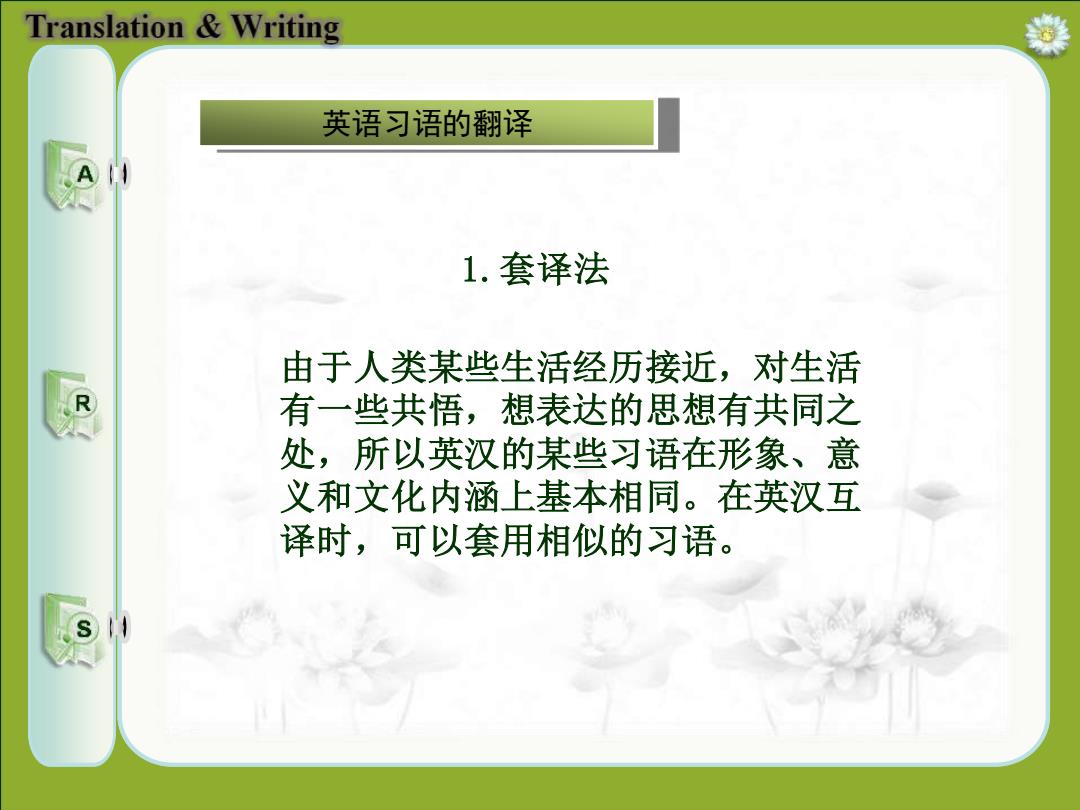
Translation Writing 英语习语的翻译 1.套译法 由于人类某些生活经历接近,对生活 有一些共悟,想表达的思想有共同之 处,所以英汉的某些习语在形象、意 义和文化内涵上基本相同。在英汉互 译时,可以套用相似的习语
1.套译法 英语习语的翻译 由于人类某些生活经历接近,对生活 有一些共悟,想表达的思想有共同之 处,所以英汉的某些习语在形象、意 义和文化内涵上基本相同。在英汉互 译时,可以套用相似的习语
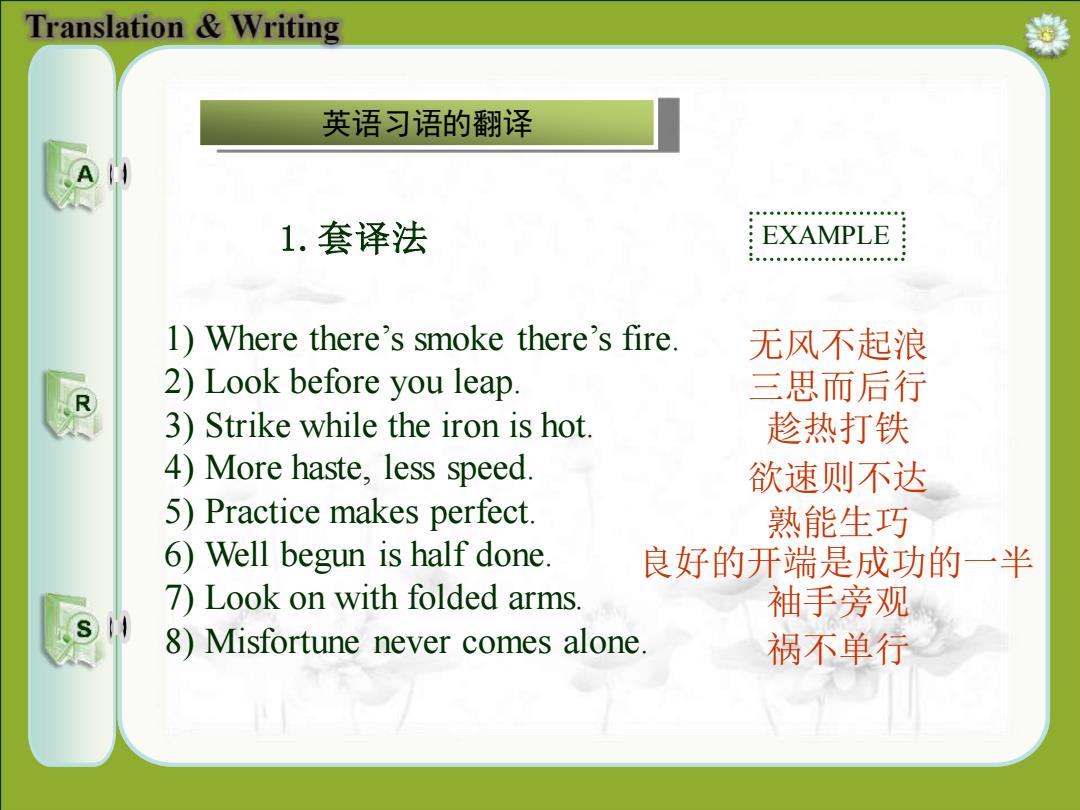
Translation Writing 英语习语的翻译 1.套译法 EXAMPLE 1)Where there's smoke there's fire. 无风不起浪 2)Look before you leap 三思而后行 3)Strike while the iron is hot. 趁热打铁 4)More haste,less speed. 欲速则不达 5)Practice makes perfect. 熟能生巧 6)Well begun is half done 良好的开端是成功的一半 7)Look on with folded arms. 袖手旁观 8)Misfortune never comes alone. 祸不单行
EXAMPLE 1) Where there’s smoke there’s fire. 2) Look before you leap. 3) Strike while the iron is hot. 4) More haste, less speed. 5) Practice makes perfect. 6) Well begun is half done. 7) Look on with folded arms. 8) Misfortune never comes alone. 英语习语的翻译 1.套译法 无风不起浪 三思而后行 趁热打铁 欲速则不达 熟能生巧 良好的开端是成功的一半 袖手旁观 祸不单行
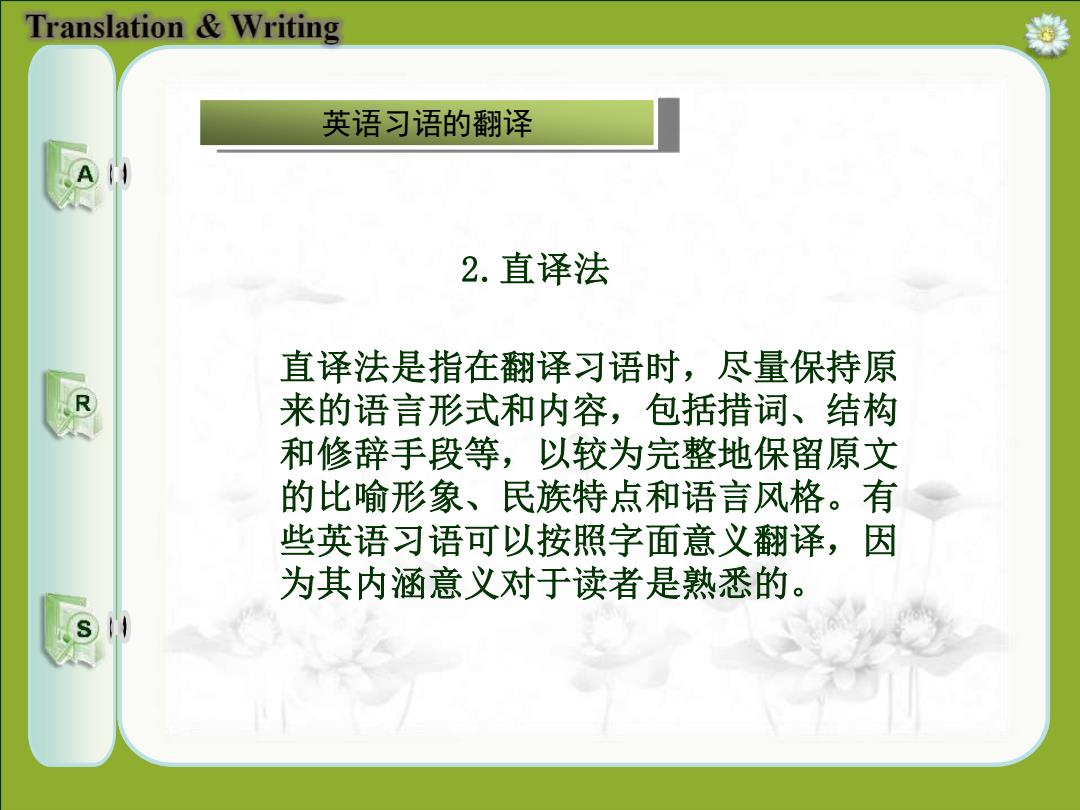
Translation Writing 英语习语的翻译 2.直译法 直译法是指在翻译习语时,尽量保持原 来的语言形式和内容,包括措词、结构 和修辞手段等,以较为完整地保留原文 的比喻形象、民族特点和语言风格。有 些英语习语可以按照字面意义翻译,因 为其内涵意义对于读者是熟悉的
2.直译法 英语习语的翻译 直译法是指在翻译习语时,尽量保持原 来的语言形式和内容,包括措词、结构 和修辞手段等,以较为完整地保留原文 的比喻形象、民族特点和语言风格。有 些英语习语可以按照字面意义翻译,因 为其内涵意义对于读者是熟悉的
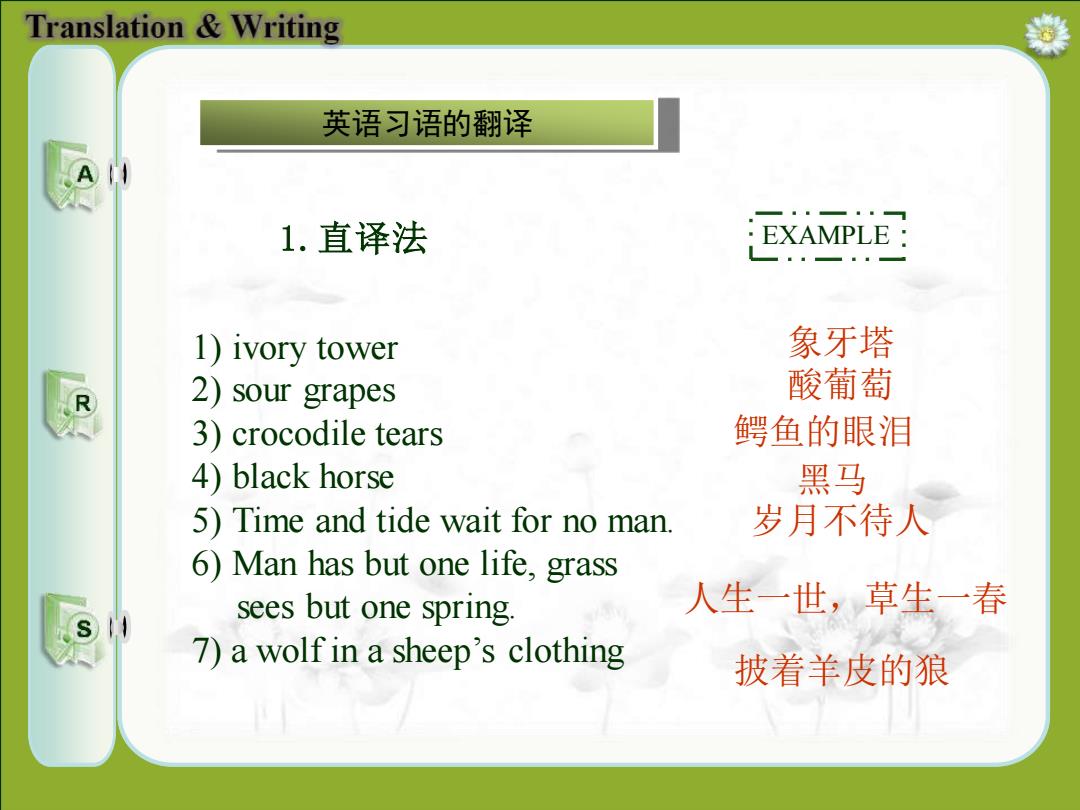
Translation Writing 英语习语的翻译 1.直译法 EXAMPLE 1)ivory tower 象牙塔 2)sour grapes 酸葡萄 3)crocodile tears 鳄鱼的眼泪 4)black horse 黑马 5)Time and tide wait for no man. 岁月不待人 6)Man has but one life,grass sees but one spring. 人生一世,草生一春 7)a wolf in a sheep's clothing 披着羊皮的狼
EXAMPLE 1) ivory tower 2) sour grapes 3) crocodile tears 4) black horse 5) Time and tide wait for no man. 6) Man has but one life, grass sees but one spring. 7) a wolf in a sheep’s clothing 英语习语的翻译 1.直译法 象牙塔 酸葡萄 黑马 鳄鱼的眼泪 岁月不待人 披着羊皮的狼 人生一世,草生一春
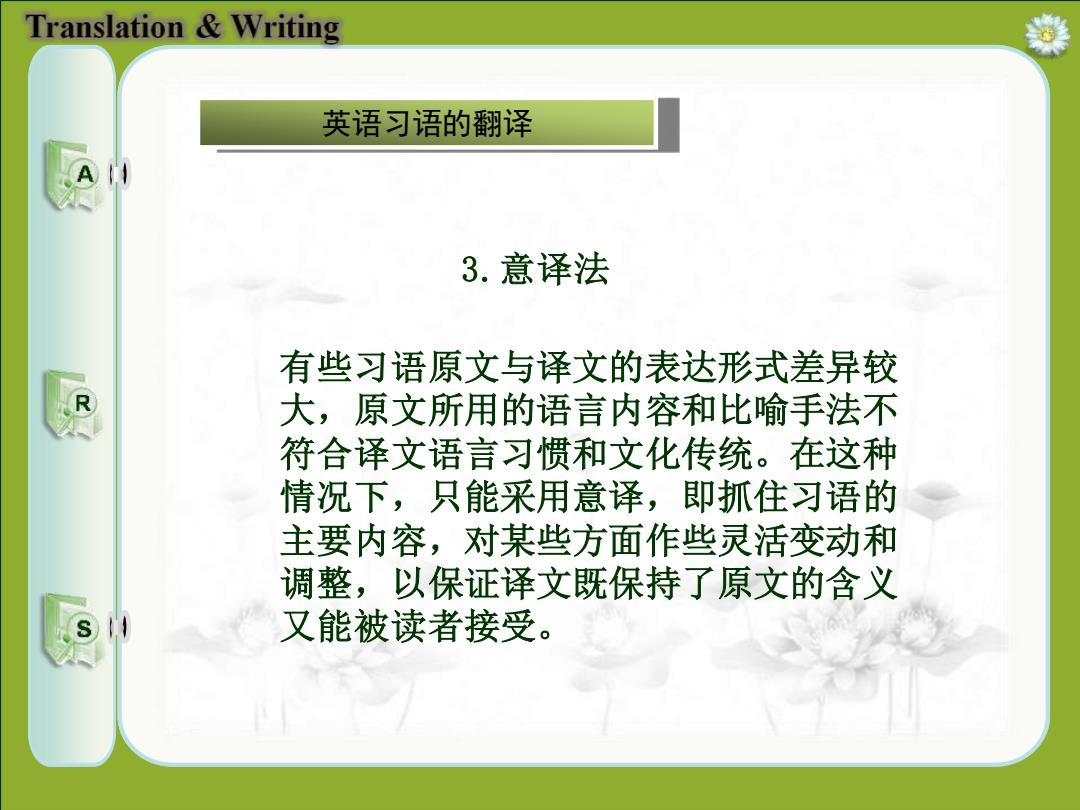
Translation Writing 英语习语的翻译 3.意译法 有些习语原文与译文的表达形式差异较 大,原文所用的语言内容和比喻手法不 符合译文语言习惯和文化传统。在这种 情况下,只能采用意译,即抓住习语的 主要内容,对某些方面作些灵活变动和 调整,以保证译文既保持了原文的含义 又能被读者接受
3.意译法 英语习语的翻译 有些习语原文与译文的表达形式差异较 大,原文所用的语言内容和比喻手法不 符合译文语言习惯和文化传统。在这种 情况下,只能采用意译,即抓住习语的 主要内容,对某些方面作些灵活变动和 调整,以保证译文既保持了原文的含义 又能被读者接受
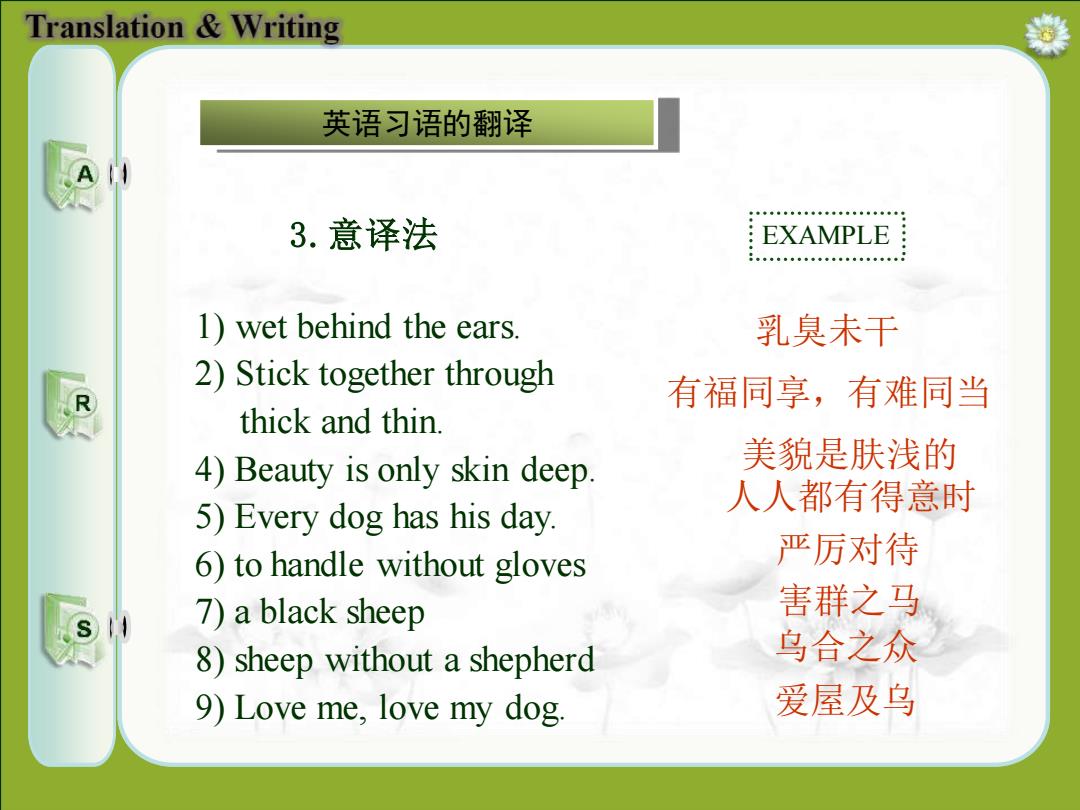
Translation Writing 英语习语的翻译 3.意译法 EXAMPLE 1)wet behind the ears. 乳臭未干 2)Stick together through 有福同享,有难同当 thick and thin. 4)Beauty is only skin deep 美貌是肤浅的 5)Every dog has his day. 人人都有得意时 6)to handle without gloves 严厉对待 7)a black sheep 害群之马 8)sheep without a shepherd 鸟合之众 9)Love me,love my dog. 爱屋及乌
EXAMPLE 1) wet behind the ears. 2) Stick together through thick and thin. 4) Beauty is only skin deep. 5) Every dog has his day. 6) to handle without gloves 7) a black sheep 8) sheep without a shepherd 9) Love me, love my dog. 英语习语的翻译 3.意译法 乳臭未干 有福同享,有难同当 美貌是肤浅的 人人都有得意时 严厉对待 乌合之众 害群之马 爱屋及乌
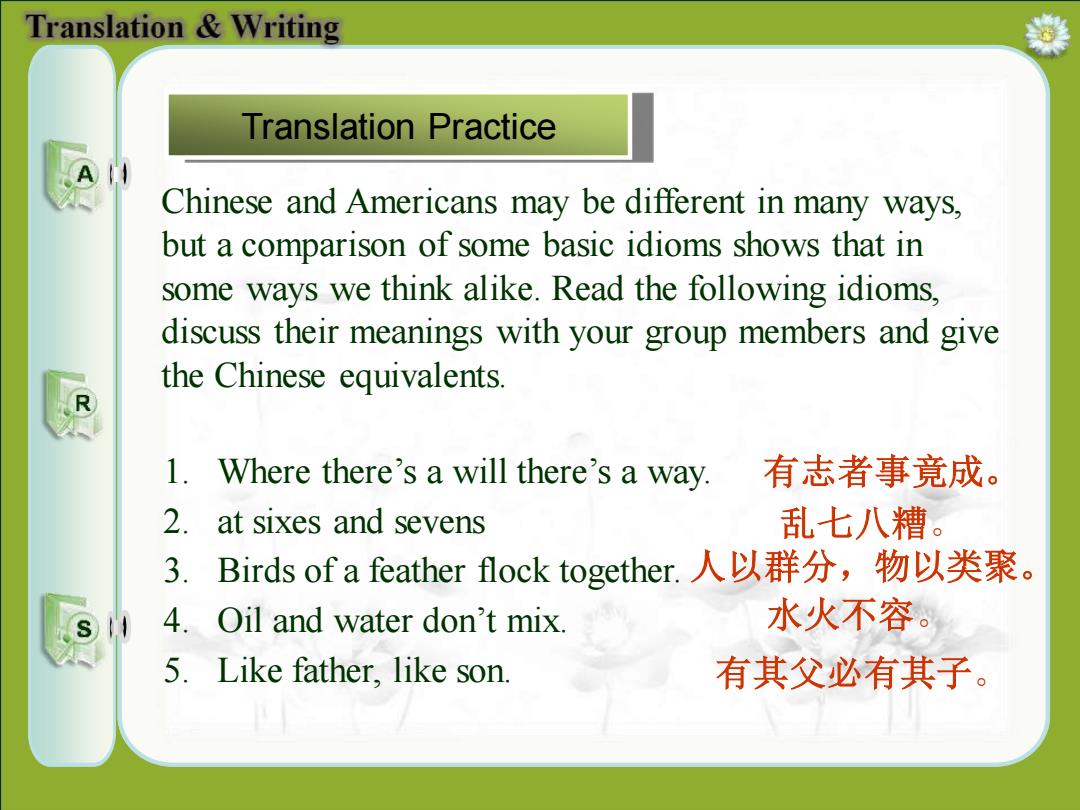
Translation Writing Translation Practice Chinese and Americans may be different in many ways, but a comparison of some basic idioms shows that in some ways we think alike.Read the following idioms, discuss their meanings with your group members and give the Chinese equivalents. 1.Where there's a will there's a way. 有志者事竟成。 2.at sixes and sevens 乱七八糟。 3. Birds of a feather flock together..人以群分,物以类聚。 4.Oil and water don't mix. 水火不容。 5.Like father,like son 有其父必有其子
Translation Practice 1. Where there’s a will there’s a way. 2. at sixes and sevens 3. Birds of a feather flock together. 4. Oil and water don’t mix. 5. Like father, like son. Chinese and Americans may be different in many ways, but a comparison of some basic idioms shows that in some ways we think alike. Read the following idioms, discuss their meanings with your group members and give the Chinese equivalents. 乱七八糟。 人以群分,物以类聚。 水火不容。 有其父必有其子。 有志者事竟成

Translation Writing Translation Practice 6.Out of sight,out of mind. 眼不见,心不烦。 7.All good things must come to an end.天下没有不散的宴席。 8.Great minds think alike.英雄所见略同。 R 9.Too many cooks spoil the broth. 厨师多坏一锅汤。 10.You get sick by what you put in your mouth,but you can be hurt by what comes out of your mouth 病从口入,祸从口出
Translation Practice 6. Out of sight, out of mind. 7. All good things must come to an end. 8. Great minds think alike. 9. Too many cooks spoil the broth. 10. You get sick by what you put in your mouth, but you can be hurt by what comes out of your mouth. 眼不见,心不烦。 天下没有不散的宴席。 英雄所见略同。 厨师多坏一锅汤。 病从口入,祸从口出

Translation Writing Writing Directions:Base on the result of your discussion,write a composition on either of the topics: 1)Dining Customs in China 2)Taboos in China
Writing ❖Directions: Base on the result of your discussion, write a composition on either of the topics: 1) Dining Customs in China 2) Taboos in China